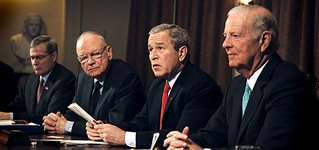 The Iraq Study Report may be the wake-up call for the war effort, a document that, while breaking no new ground on offering solutions, is effective both because of its brevity and its bipartisan genesis. The group, commissioned by Congress in March, was composed of ten bipartisan members and chaired by James Baker III and Lee Hamilton, two former Capitol Hill operatives as known for their clear-eyed intellect and drive as for their political inclinations. Consequently, it won’t do for the President to dismiss its findings as the partisan rant of the Democrats looking for payback. The power of the report is the simplicity of its arguments and the variety of voices, from both sides of the aisle, roused to make them.
The Iraq Study Report may be the wake-up call for the war effort, a document that, while breaking no new ground on offering solutions, is effective both because of its brevity and its bipartisan genesis. The group, commissioned by Congress in March, was composed of ten bipartisan members and chaired by James Baker III and Lee Hamilton, two former Capitol Hill operatives as known for their clear-eyed intellect and drive as for their political inclinations. Consequently, it won’t do for the President to dismiss its findings as the partisan rant of the Democrats looking for payback. The power of the report is the simplicity of its arguments and the variety of voices, from both sides of the aisle, roused to make them.For some, and despite the sense of fellow feeling the report is meant to convey, criticism of the Republican war effort is implicit in its conclusions. Sen. Barack Obama of Illinois, interviewed Wednesday by CNN’s Anderson Cooper, said “it would be hard not to see in this report a rebuke of an ideologically-driven strategy that has been blind to what’s [been] happening on the ground for the last several years.”
Even before the thing came out, the White House and its proxies were spinning furiously, downplaying the impact of something they hadn’t seen yet. Gen. Peter Pace tried to have it both ways when asked to characterize the progress of American forces in Iraq. “We’re not winning, but we’re not losing,” the general said, uttering words that we never thought we’d hear coming from one of the Joint Chiefs of Staff.
Hell, there’s not a military man in the last hundred years, from George S. Patton to Beetle Bailey, that doesn’t know the fundamental rule of American military might: it is not defined by attrition. Standing still is contrary to the military dynamic – and especially the American military dynamic. With the instincts, power and stealth of a shark, the American military machine is defined by forward action. In the classic zero-sum gain scenario, if the U.S. military isn’t winning, it is losing. And we’ve come to understand, over the last three years and nine months, that the Iraq war doesn’t respond to the convenient polarities of “winning” and “losing” anyway, even if the Cold Warriors still do.
For Obama, and no doubt for others, the report is a step toward distilling that kind of verbiage and administration spin into something coherent and accurate. “For the first time, what we’re seeing is a bipartisan agreement about facts on the ground,” he said.
The big question is what President Bush will do with it. Early signs are not promising. Today a testy Bush did a joint standup with British Prime Minister Tony Blair, himself a lame duck as leader of the UK, and essentially repeated his longstanding contention that staying the course is the only viable strategy.
 At the root of the president’s persistent calculus is the need to keep American forces in place in Iraq until a viable government can establish rule of law over the entire country. But that reasoning in pursuit of a Middle Eastern democracy that can, in Bush’s words, “govern itself, sustain itself and defend itself” may be ultimately self-defeating.
At the root of the president’s persistent calculus is the need to keep American forces in place in Iraq until a viable government can establish rule of law over the entire country. But that reasoning in pursuit of a Middle Eastern democracy that can, in Bush’s words, “govern itself, sustain itself and defend itself” may be ultimately self-defeating. The truest test of a democracy is what happens when you take away the guns needed to start one. Sooner or later, the democratic ideal can’t be enforced at gunpoint; a democratic government’s got to take root and flourish on its own. Ultimately it stands or falls on nothing more, or less, than the confidence, good will and energies of the people living in it. For that reason, the United States will never know for certain if Iraq is capable of a functional, thriving participatory democracy until we do leave.
The Iraq Study Report, therefore, calls out the Bush administration to set a timetable not so much for our troops’ withdrawal as for the moment for the Iraqi people to decide -- indigenously, on their own terms -- whether they believe in that form of government or not. At the very least, the report is a forthright cry for reality as well as action. In that respect, it’s a valuable document. Let’s hope the White House sees that.
-----
Image credit: The White House (public domain)






No comments:
Post a Comment